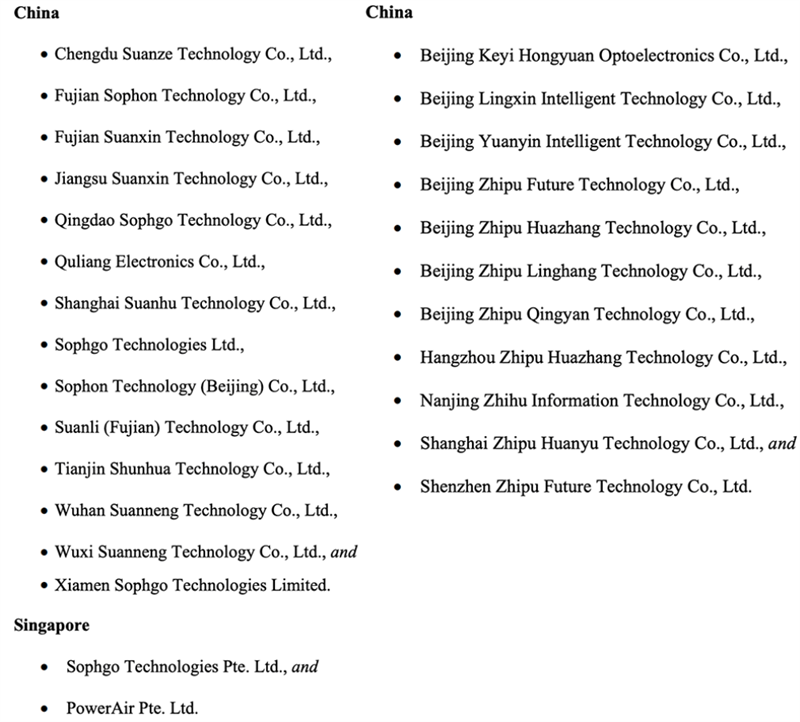The U.S. Department of Commerce's Bureau of Industry and Security (BIS) released new regulations late last night to strengthen export controls on advanced computing semiconductors and add several Chinese and Singaporean entities to its Entity List. Along with these actions, BIS also unveiled a "whitelist" of approved chip design companies and OSAT (Outsourced Semiconductor Assembly and Testing) providers. To join the whitelist, applicants must demonstrate the ability to prevent the misuse of resources. U.S. officials stated that these new regulations aim to clarify objectives, tighten control, and prevent U.S. technology from being abused, particularly to curb concerns over national security and to further combat Chinese efforts to evade restrictions.
U.S. Department of Commerce’s New Regulations
The BIS issued two key regulations: one updates export controls on advanced computing semiconductors, and another adds 14 Chinese entities and 2 Singaporean entities to the Entity List. Additionally, another press release announced 11 more Chinese entities being added to the list, including companies like Qu Liang Electronics, Suaneng Technology, Zhipu, and KeYiHongYuan. Exports of advanced chips now require broad licensing; however, exemptions are possible if the chips are exported to trusted designers, packaging is done outside China, or the chips meet performance or transistor count standards.

Chip Whitelist: 33 IC Design Companies and 24 OSAT Providers
The BIS unveiled the "approved" list, which includes 33 chip design companies and 24 OSAT providers. Essentially, only companies on this list will be allowed to handle advanced computing chips, often referred to as "high-end" chips.
How to Apply for the IC Design Company List
Applicants, whether IC design companies or OSAT providers, must demonstrate their ability to "prevent misuse and diversion of computing resources." Applications should be submitted to BIS in the form of consultation opinions.
Here is the list of approved IC design companies:
1. Advanced Micro Devices, Inc. (AMD)
2. Alphabet Inc. (Google)
3. Amazon.com, Inc.
4. Analog Devices, Inc.
5. Apple Inc.
6. BAE Systems, Inc.
7. Block, Inc.
8. The Boeing Company
9. Broadcom Inc.
10. Cerebras Systems, Inc.
11. Cisco Systems, Inc.
12. Hewlett Packard Enterprise Company
13. Honeywell International, Inc.
14. Infineon Technologies AG
15. Intel Corporation
16. International Business Machines Corporation (IBM)
17. L3Harris Technologies, Inc.
18. Marvell Technology, Inc.
19. MediaTek Inc.
20. Meta Platforms, Inc.
21. Micron Technology, Inc.
22. Microsoft Corporation
23. Mitsubishi Group
24. Nokia Corporation
25. Nvidia Corporation
26. NXP Semiconductors N.V.
27. Qualcomm Incorporated
28. Raytheon Company
29. Realtek Semiconductor Corporation
30. Sony Group Corporation
31. Tesla, Inc.
32. Texas Instruments
33. Western Digital Technologies, Inc.
OSAT Providers List
To apply for inclusion in the OSAT list, applicants must also prove their ability to prevent resource misuse and submit their application through a specified consultation opinion process. OSAT suppliers are also subject to a specific inter-departmental review process. The approved OSAT providers are:
1. Amkor Technology, Inc.
2. Ardentec Corporation
3. ASE Technology Holding Co., Ltd.
4. Doosan Tesna Inc.
5. Fabrinet
6. Giga Solution Tech. Co., Ltd.
7. GlobalFoundries, Inc.
8. HT Micron Semicondutores SA
9. Intel Corporation
10. IBM (International Business Machines Corporation)
11. KESM Industries Berhad
12. LB Semicon
13. Micro Silicon Electronics Co., Ltd.
14. Nepes Corporation
15. Powertech Technology Inc.
16. QP Technologies
17. Raytek Semiconductor, Inc.
18. Samsung Electronics Co., Ltd.
19. SFA Semicon
20. Shinko Electric Industries Co., Ltd.
21. Sigurd Microelectronics Corporation
22. Steco Co., Ltd.
23. Taiwan Semiconductor Manufacturing Company (TSMC)
24. United Microelectronics Corporation (UMC)
U.S. Government’s Statement
Commerce Secretary Gina M. Raimondo emphasized that these regulations will further clarify goals and strengthen controls to ensure that China and other entities attempting to bypass U.S. laws and threaten U.S. national security will not succeed. Alan F. Estevez, Deputy Secretary of Commerce for Industrial and Security Affairs, reiterated the U.S. commitment to preventing advanced technology from being misused, specifically concerning concerns about China’s military-civilian integration. Kevin J. Curran, Assistant Secretary for Export Enforcement, stated that preventing unauthorized parties from obtaining the most advanced semiconductor technologies remains a BIS enforcement priority, and the U.S. will continue to target Chinese attempts to circumvent controls.
Chinese Government’s Response
On January 15, China’s Ministry of Commerce expressed strong dissatisfaction and firm opposition to the Biden administration's recent wave of trade restrictions, stating that these measures seriously infringe upon the legitimate rights and interests of Chinese companies, disrupt market rules, and threaten global supply chain stability. Regarding the Netherlands’ expanded export controls on semiconductor-related items, China’s spokesperson urged the Dutch government to respect market principles and the spirit of contracts to maintain global semiconductor supply chain stability.
Background and Purpose of New Regulations
The new BIS regulations build on previous measures from October 7, 2022, October 17, 2023, and December 2, 2024, and aim to limit China’s access to certain high-end chips crucial for military advantage. The U.S. government has expressed concerns that advanced artificial intelligence capabilities, driven by supercomputing and based on cutting-edge semiconductors, could be used in military applications. BIS’s actions are based on the 2018 Export Control Reform Act and its implementing regulations, providing the U.S. with various tools to control exports and certain activities.
+86 191 9627 2716
+86 181 7379 0595
8:30 a.m. to 5:30 p.m., Monday to Friday
